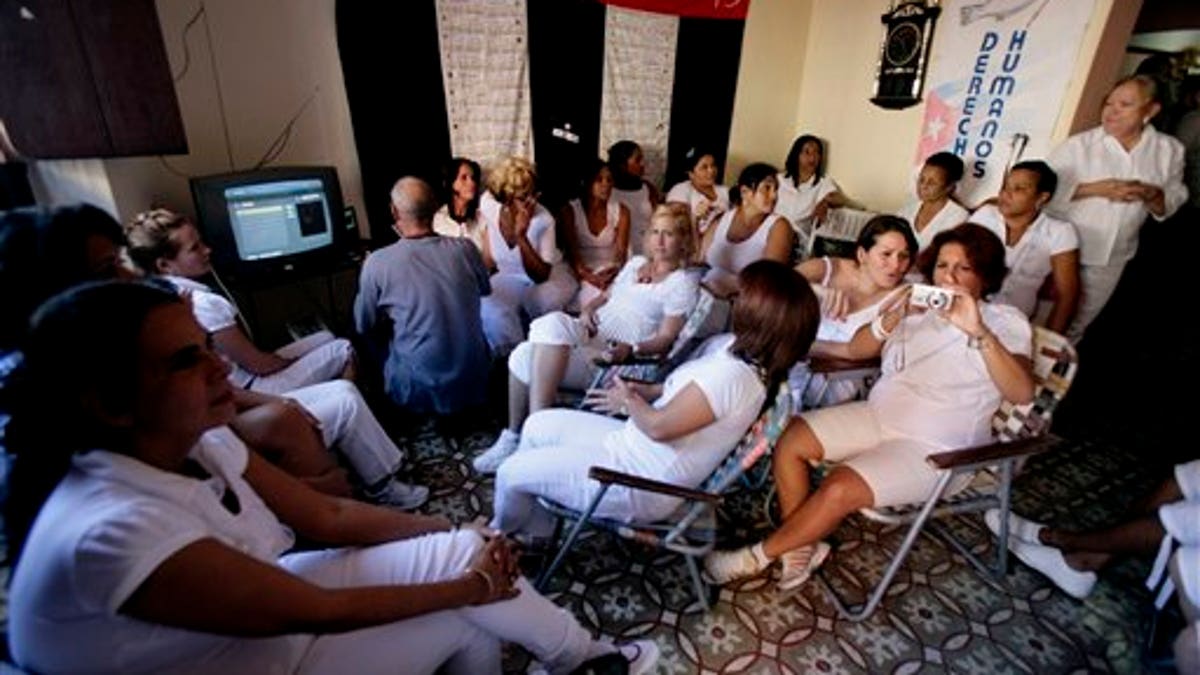
Members of Cuban dissident group Ladies in White gather in a home to commemorate the anniversary of the 2003 government crackdown on dissidents in Havana, Cuba, Friday March 18, 2011. Some 75 activists, intellectuals and social commentators were arrested in the 2003 sweep and sentenced to long jail terms. The government agreed last year to free all that remained in prison, and two of those arrested in the crackdown are still being held. (AP Photo/Javier Galeano)
On the eighth anniversary of Cuba’s controversial crackdown on dissidents, Cubans on the island marked the day in starkly opposing ways.
The “Ladies in White,” a group of wives, daughters and mothers of the 75 dissidents gathered Friday inside a home of a prominent dissident, Laura Pollan, to observe the day. The dissidents are activists, intellectuals and independent journalists who were rounded up and jailed for years.
Outside the home, about 200 government supporters encircled Pollan’s house, one of the Ladies in White leaders, and called them "worms" and shouted slogans in support of brothers Fidel and Raul Castro.
The protesters refrained from shouting some of the more sexually offensive remarks sometimes directed at the group.
Raul Castro became president of Cuba on a temporary basis in 2006, after Fidel became seriously ill. The temporary status changed in 2008, when Fidel, who remained ill, said he would not return to the presidency.
The Ladies in White have been marching peacefully each Sunday since their loved ones were arrested in the government crackdown in March 2003 that put 75 dissidents behind bars, most with long sentences on charges including treason.
The government made a landmark deal with the Roman Catholic Church last July to free all the political prisoners it still held from the sweep, a number that had dropped to 52 due to previous releases.
This week, the Catholic Church said Cuba’s officials promised to release one of the political prisoners, Ricardo Librado Linares Garcia.
Church spokesman Orlando Marquez said that, apart from those jailed in 2003, authorities are also freeing nine other prisoners and sending them into exile in Spain, along with their families. Most of them were in jail for violent, but politically motivated crimes.
Just two prisoners from the 2003 crackdown remain -- Felix Navarro and Jose Daniel Ferrer -- and both are expected to be freed in the coming days or weeks.
Most political prisoners have accepted the government’s offer to go into exile in Spain. But about a dozen prisoners from the 2003 sweep have refused to go – saying that they will not agree to be deported from their homeland -- and have been allowed to return to their homes in Cuba.
The government considers the dissidents to be common criminals. It says they take money from Washington to destabilize the island and bring down its socialist revolution.
While the Damas are mostly allowed to march and gather peacefully, the so-called “act of repudiation” Friday by people holding signs in support of the Communist regime is not uncommon.
This story contains material from The Associated Press.
Follow politics and immigration reporter Elizabeth Llorente on Twitter: @LlorenteLatino
Elizabeth.Llorente@FoxNewsLatino.com
Follow us on twitter.com/foxnewslatino
Like us at facebook.com/foxnewslatino




